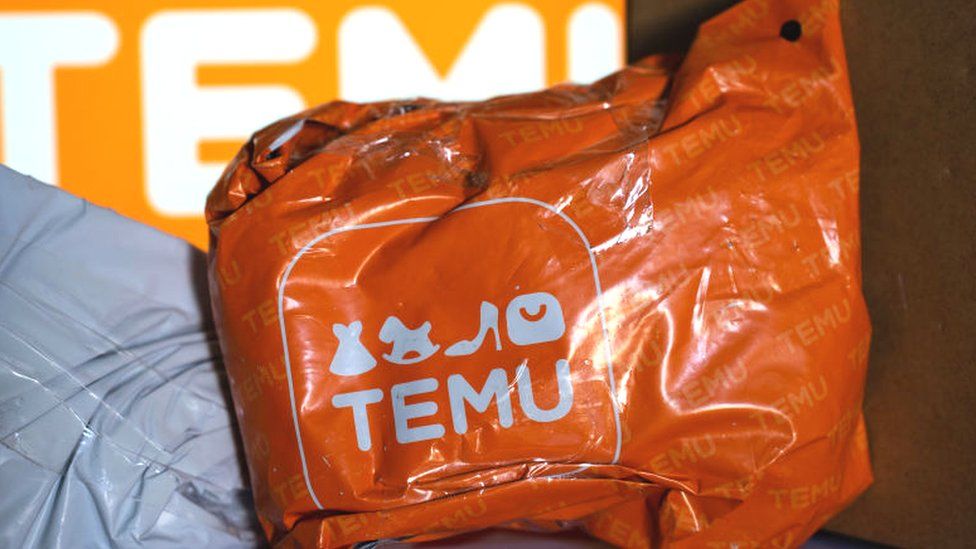ARTICLE AD BOX
 Image source, Getty Images
Image source, Getty Images
It's estimated that 152 million Americans use Temu every month
By Sam Gruet
Business and technology reporter
A record 123 million Americans tuned into this year's Super Bowl.
But as well as getting the nation's biggest sporting event, a blockbuster halftime performance and several camera cutaways of Taylor Swift in the crowd, they also got six 30-second commercials for Temu - a Chinese-owned e-commerce company.
The shopping giant has been criticised by politicians in the UK and US - a US government investigation finding an "extremely high risk" that products sold on Temu could have been made with forced labour.
Temu says it "strictly prohibits" the use of forced, penal, or child labour by all its merchants.
The company, which sells everything from clothes to electronics and furniture, first launched in the US in 2022 and later in the UK and the rest of the world.
Since then, it has consistently topped global app download charts, with just under 152 million Americans using it every month, according to data gathered by analyst SimilarWeb.
It's "Amazon on steroids," says retail analyst Neil Saunders, and with the tagline "shop like a billionaire" it has exploded in popularity, shipping to 49 countries worldwide.
Image source, Temu
Image caption,Temu spent close to $1.7bn on ads in 2023, according to SimilarWeb
A typical 30-second Super Bowl commercial costs around $7m (£5.5m), during this year's event Temu had six of them.
"It's a lot of money for a very, short commercial," Mr Saunders says.
"But it is seen by an enormous number of people and we know that after that commercial Temu's downloads spiked," he adds.
SimilarWeb data suggests individual visitors to the platform worldwide were up by nearly a quarter on the day of the Super Bowl compared with the previous Sunday, with 8.2 million people browsing the website and app. In the same period, Amazon and Ebay's visitors were down by 5% and 2% respectively.
"They've also spent a lot of money on micro-marketing, persuading influencers to push products and to suggest buying things on the platform via social channels like TikTok and YouTube," says Mr Saunders.
These influencers typically have fewer than 10,000 followers according to Ines Durand, an e-commerce expert at SimilarWeb.
"Micro-influencers have strong communities, so their endorsement means a strong trust towards these products," she explains.
Temu is owned by Chinese giant Pinduoduo - "a monster in Chinese e-commerce," according to Shaun Rein, founder of the China Market Research Group.
"Throughout China, everyone buys products on Pinduo, from speakers to t-shirts or socks," he says.
The company consistently trades places with rival Alibaba for the top spot of most valuable Chinese firm listed on a US stock exchange. Its current worth sits at just under $150bn (£117bn).
With the Chinese consumer market under its spell, Pinduoduo expanded overseas with Temu, using the same model that had ensured its previous success. According to Mr Rein, who is based in Shanghai, the firm has become a great source of pride and patriotism.
"They're proud that Chinese companies can slay the e-commerce dragons from the United States like Amazon," he adds.
A quick scroll through the Temu app or website will bring up anything from steel-toecap trainers to a device designed to help the elderly and pregnant women put on socks. A menagerie of manufactured goods, almost entirely produced in factories in China, Mr Rein explains.
"Temu use an amazing, system that relies on, heavy data collection at scale," says Ines Durand.
"They collect data on consumer trends, the most searched and clicked products, which they give to individual manufacturers."
Ms Durand says that while Amazon sells this data to manufacturers at a premium, Temu gives it to producers free of charge - information they use to "test the market" with a relatively small number of products.
The platform often uses AI-generated images to keep up to date with the very latest trends, so the product on sale may not even exist yet, according to Ms Durand. Then they are shipped by air.
"It means products don't need to be stored. They don't need to go to warehouses once it's shipped by aeroplane, you go straight to the customer," says Ines Durand.
Image source, Getty Images
Image caption,Temu ships straight from factories in China to the customer
A third of parcels that came into the US last year under a shipping loophole known as the de minimis threshold were from Temu and competitor Shein, according to a report from US Congress.
Many countries - including the UK and USA have a de minimis threshold, designed to help citizens to import goods.
So as Temu's goods are shipped directly from the factory floors, cutting out the middlemen, they become essentially duty-free.
More regulation may be on the horizon to close up shipping loopholes, however, according to Mickey Diaz, chief operating officer at global freight company Unique Logistics.
"The UK has already started to look at Temu with some scrutiny, including the sale of weapons that are otherwise not allowed into the UK, which were being imported because of these loopholes," she explains.
Temu has been criticised for its supply chains too, with UK and US politicians accusing the e-commerce giant of allowing goods produced with forced labour to be sold on its site.
Last year, Alicia Kearns MP, head of the foreign affairs select committee, told the BBC she wanted greater scrutiny of the online marketplace to make sure "consumers are not inadvertently contributing to the Uyghur genocide".
Temu says it "strictly prohibits" the use of forced, penal, or child labour by all its merchants.
It told the BBC anyone doing business with it must "comply with all regulatory standards and compliance requirements".
"Temu's merchants, suppliers, and other third parties must pay their employees and contractors on time and comply with all applicable local wage and hours laws.
"Our current standards and practices are no different from other major e-commerce platforms trusted by consumers, and allegations in this regard are completely ungrounded," a spokesperson added.
Despite the controversy, analysts expect further expansion for Temu.
"We'll probably see teams start to round out its offer more, perhaps pushing into some slightly higher priced products" predicts retail analyst Neil Saunders.
According to Shaun Reid, the focus will be on grabbing an even bigger slice of the market.
"For the next two to three years, their strategy is just to grow brand awareness and market share. They don't care about profits.
"That's exactly what happened with Pinduoduo when it launched in China. They were giving incredibly cheap deals just to grab market share."

 10 months ago
1763
10 months ago
1763








 English (US) ·
English (US) ·